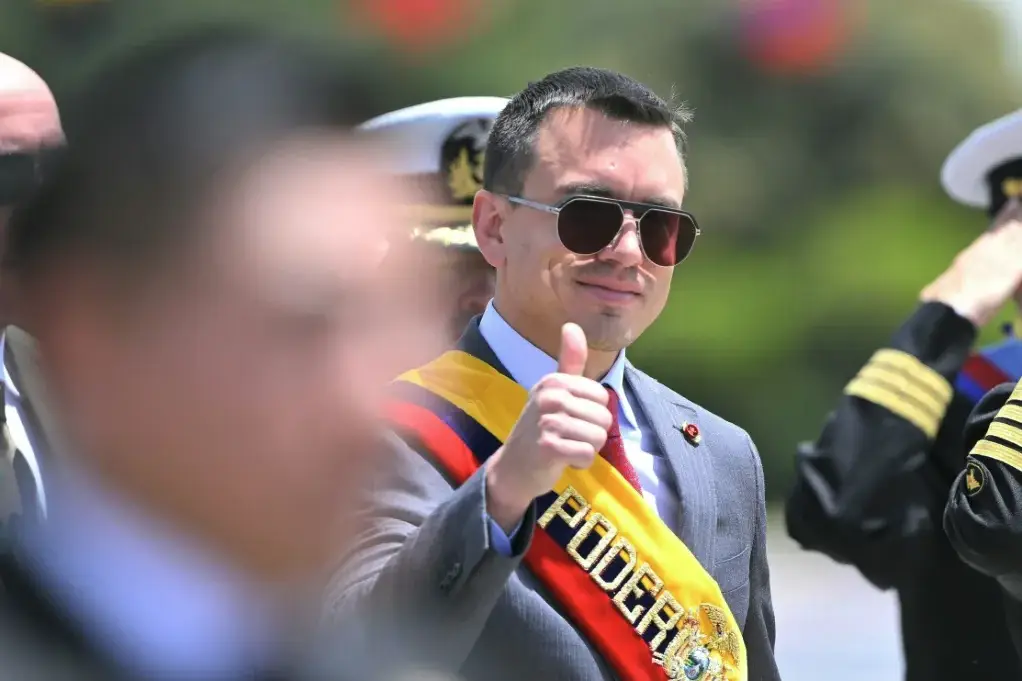Ecuador’s first round of the 2025 presidential election marked an unprecedented milestone: two political forces captured nearly 90% of the vote, reflecting an increasingly polarized political system. The race was razor-thin, but what was expected to be a close runoff ended in a 10-point lead. What tipped the scale? What explains the gap between the president and his main rival? Was fear of the return of correísmo what propped up Daniel Noboa?
Unlike previous elections, this time correísmo faced an incumbent president, weighed down by the responsibilities of governing. Noboa’s first-round results showed a decline from 2023—he paid the price for a term perceived as ineffective: blackouts lasting up to 14 hours, a security crisis with no visible results, and a rudderless economic downturn. Even so, in the runoff, his results were enough to secure victory with 55% over the 44% won by the Citizen Revolution candidate, who appeared to stagnate in the second round.
1. The desire for stability and fear of disruption
The phrase “better the devil you know than the devil you don’t” captures what happened. In a context where corruption and violence have become normalized, Ecuador chose stability—albeit mediocre—over the risks of the unknown. Noboa’s voters are aware of the criticism he faces. Still, many justify his governance, downplay his mistakes, or shift the blame to external factors: “he inherited a destroyed country,” “he’s only had a short time,” “Congress and the mafias are blocking him.”
People fear that a radical change could bring more chaos and uncertainty, especially in such a fragile environment. Rather than bet on an uncertain transformation, many Ecuadorians preferred an imperfect government that offered at least minimal certainties. Some elections are about change, others about stability. Ecuador chose stability.
It’s important to remember that in the 2025 first round, the electorate largely mirrored its 2023 preferences. Both correísmo and Noboa relied on borrowed votes, especially in cities like Quito. The polarization lies in the political offer, not in voter demand. Society shifts support from one side to another with ease. The soft vote on both sides shows increasing volatility: voters switch from one election to the next. Many made pragmatic—not ideological—decisions: Who can bring stability? Who can address urgent problems? Ecuador is in a structural crisis—economic, institutional, social—that pushes voters to seek minimal certainties, not grand promises. And there stood Noboa. At the core, Ecuadorians are not asking for miracles—they want results. Security, stability, peace. Noboa gained the benefit of the doubt that he could provide them.
Despite a lack of concrete outcomes, his short term in office, his still-fresh image compared to his opponents, and the perception that “he’s not that bad” gave him leeway. His message that “Ecuador is moving forward” allowed him to be judged not by the effectiveness of his decisions, but by his potential. Ecuador granted him an extension.
2. The shadows of Correísmo: Dollarization, drug trafficking, and Venezuela
Noboa’s support doesn’t necessarily stem from his own merits, but rather from the need to avoid a scenario even more widely rejected: the return of correísmo. For many, the continuation of the current administration was less frightening than correísmo’s comeback.
Sometimes, avoiding mistakes is more important than getting it right. And that’s what happened to correísmo. Although Luisa González didn’t explicitly propose changing the dollarization regime, the issue dominated the runoff debate due to ambiguous statements from her camp. Demobilizing Luisa’s voters was just as important as mobilizing Noboa’s base, and on the topic of dollarization, Noboa found a key opportunity to sow doubt about the country’s economic future.
Another crucial issue was security. In the Ecuadorian collective mindset, there’s a prevailing idea that the peace during Correa’s government was achieved through pacts with drug traffickers. Although this idea isn’t backed by solid evidence—experts point to a combination of public policy, material conditions, and external factors—the “pact” narrative has taken hold.
González’s campaign failed to dismantle that perception. It focused on accusing Noboa of alleged ties to the same underworld but lacked convincing proof or an alternative narrative. Moreover, correísmo—like many leftist projects—argues that security must be tackled alongside poverty, as two sides of the same coin. While valid, that stance is hard to explain to an electorate that wants a “tough hand” and admires figures like Bukele (Latinobarómetro, 2024).
3. A heterogeneous base: Support that goes beyond anti-correísmo
Support for Noboa is heterogeneous: women, youth, middle and lower classes, impoverished sectors seeking some form of stability amid chaos. In 2023, impoverished provinces in the Central Highlands voted for him. In the first round of 2025, those votes went to Iza, but in the runoff they returned to Noboa.
The middle class—which is really a popular class with aspirations—distrusts projects like the Citizen Revolution. In Noboa, they see a personalized figure: a young businessman with international projection (ties to Trump, global image), husband of a public figure perceived as relatable and altruistic. This isn’t right-wing ideology in action: it’s the power of personalization in a country where trust in institutions has collapsed.
The image of a self-made man, a young entrepreneur and family man, adds a layer of emotional trust. And that support is evident in impoverished areas like the Central Highlands. Iza’s support wasn’t strong enough to consolidate a unified front against Noboa. His leadership, though symbolically powerful, failed to offer a unified or organic vision. Many who backed him in 2023 returned to Noboa without ideological conflict.
Machiavelli said that a successful ruler doesn’t rely solely on luck, but on the ability to master fortune with boldness, virtue, and preparation. He also warned that the secret to power lies in timing. Noboa seized his moment: he made the fear of the past the central issue, rather than his own project. Because history doesn’t always reward the best—it rewards those who know how to seize their chance. And this time, Noboa did.
*Machine translation proofread by Janaína da Silva.













